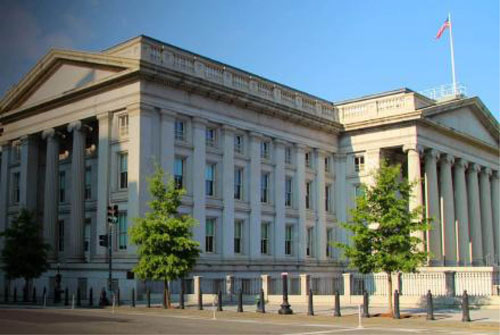The US Department of Treasury announced a new general license “involving Afghanistan or governing institutions in Afghanistan” aimed to facilitate a broad range of commercial activities in the country.
In a statement released by the US State Department, the new general license says that financial institutions, non-governmental organizations, international organizations, and private sector companies can engage in wide-ranging transactions and activities in Afghanistan while complying with US sanctions.
“The affected sectors include personal and commercial banking, infrastructure development and maintenance, commercial trade, safety and maintenance operations for transportation systems, and telecommunications and information transactions,” the statement reads.
According to the department, the new license enables companies and organizations to work with Afghan governing institutions and do transactions. The statement, however, said the sanctions on Islamic Emirate officials remain in place.
“Today’s action facilitates private companies and aid organizations working with Afghan governing institutions and paying customs, duties, fees, and taxes, including institutions that are headed by sanctioned individuals,” the statement reads.
The statement said the new license will benefit the people of Afghanistan, stressing that the US stand with the people of Afghanistan as they work to rebuild their economy.
Previously the Treasury Department issued multiple licenses aimed to facilitate humanitarian assistance to Afghanistan as well as sending remittances by Afghans working abroad.
Meanwhile, the US Department of Treasury issued three General Licenses to facilitate the continued flow of humanitarian assistance to Afghanistan from the international community and international organizations amid severe economic challenges in Afghanistan.
This creates a way for international donors to work around US sanctions against the “Taliban or Haqqani Network” if certain conditions are met.
The Treasury Department said the new licenses are part of US efforts to help the people of Afghanistan, and emphasized that the authorization of the new and previous licenses allows the flow of humanitarian assistance, personal remittances, and other support to flow to the people of Afghanistan.
“The United States is the largest single provider of humanitarian assistance in Afghanistan. We are committed to supporting the people of Afghanistan, which is why Treasury is taking these additional steps to facilitate assistance,” said Deputy Secretary of the Treasury Wally Adeyemo. “Unfortunately, the economy faces grave challenges, exacerbated by the country’s long dependence on foreign aid, donor and private sector flight sparked by the Taliban’s takeover, drought, structural macroeconomic issues, and the COVID-19 pandemic. Treasury has provided broad authorizations that ensure NGOs, international organizations, and the US government can continue to provide relief to those in need.”
The new General Licenses, 17, 18, 19, authorize transactions and activities involving the Taliban.
“General License 17 authorizes all transactions and activities involving the Taliban or the Haqqani Network that are for the conduct of the official business of the United States Government by employees, grantees, or contractors thereof, subject to certain conditions,” the Treasury Department said.
“General License 18 authorizes all transactions and activities involving the Taliban or the Haqqani Network that are for the conduct of the official business of certain international organizations and other international entities by employees, grantees, or contractors thereof, subject to certain conditions,” the department said.
“General License 19 authorizes all transactions and activities involving the Taliban or the Haqqani Network, that are ordinarily incident and necessary to the following activities by nongovernmental organizations (NGOs), subject to certain conditions: humanitarian projects to meet basic human needs; activities to support rule of law, citizen participation, government accountability and transparency, human rights and fundamental freedoms, access to information, and civil society development projects; education; non-commercial development projects directly benefitting the Afghan people; and environmental and natural resource protection,” the department said.










